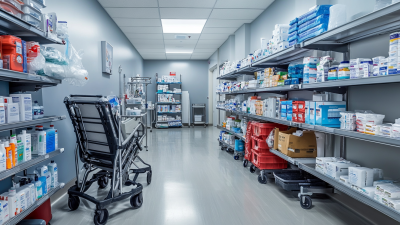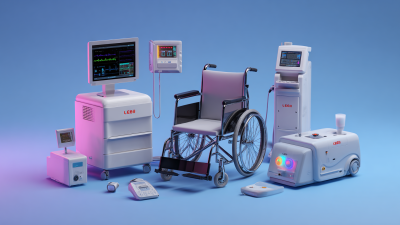Click here to browse our On The Mend Portfolio!
How to Choose the Right Hospital Supply Store for Your Healthcare Needs
In the ever-evolving healthcare landscape, selecting the right Hospital Supply Store is paramount to ensuring optimal patient care and operational efficiency. According to a report by the Healthcare Supply Chain Association, the U.S. healthcare supply chain is valued at approximately $1.5 trillion, emphasizing the critical role of reliable suppliers in maintaining quality healthcare services. Additionally, the market for medical supplies is projected to grow at a compound annual growth rate (CAGR) of 7.5% from 2021 to 2028, highlighting the increasing demand for specialized products. Therefore, understanding how to navigate the myriad of options available in the hospital supply sector can significantly impact healthcare providers' ability to deliver exceptional patient outcomes and streamline their operations. This guide aims to provide essential insights into choosing the right Hospital Supply Store tailored to your unique healthcare needs.

Understanding Your Healthcare Needs: Assessing Supply Requirements
When choosing a hospital supply store, understanding your specific healthcare needs is paramount. Healthcare providers must assess their supply requirements meticulously to ensure that the right equipment and materials are accessible when needed. According to a report by Research and Markets, the global medical supplies market is projected to reach $173.9 billion by 2026, indicating a robust demand for quality medical products. This growth highlights the necessity for healthcare facilities to align their supply choices with clinical needs and patient care objectives.
Evaluating factors such as specialty items, compliance standards, and logistical support is crucial. A survey from the Healthcare Purchasing News reveals that 78% of healthcare professionals prioritize supplier reliability and product availability when selecting a supply store. Furthermore, understanding the nuances of your facility's specialties can lead to more informed purchasing decisions, helping to mitigate risks associated with supply shortages. By thoroughly assessing these requirements, healthcare facilities can partner with the right hospital supply store to enhance operational efficiency and ultimately improve patient outcomes.
Evaluating Hospital Supply Store Specializations: Types of Products Offered
When selecting a hospital supply store, it’s crucial to evaluate the specializations and types of products offered. A report by the Health Industry Distributors Association (HIDA) indicates that the global market for medical supplies is expected to reach $173 billion by 2023, highlighting the importance of diverse product availability in meeting healthcare needs. Stores specializing in various categories, such as surgical supplies, diagnostic equipment, and patient care items, can significantly impact the efficiency and quality of care providers deliver.
For example, surgical supply stores often focus on providing specialized instruments, sutures, and sterilization products, which are essential for hospitals performing complex procedures. Meanwhile, suppliers of diagnostic equipment, such as imaging machines and laboratory supplies, play a vital role in diagnostics and patient monitoring.
According to a report from Market Research Future, the demand for diagnostic imaging in healthcare facilities is anticipated to grow at a CAGR of 6.3% from 2022 to 2028. Selecting a hospital supply store that aligns with these specific categories ensures healthcare providers have access to the critical equipment and supplies necessary for optimal patient outcomes.
Analyzing Pricing Structures and Budget Considerations for Healthcare Supplies
When selecting a hospital supply store to meet your healthcare needs, understanding pricing structures is vital. Different suppliers offer varying degrees of price transparency, which can significantly impact your budget. Some stores may present bulk pricing options that initially seem cost-effective, but hidden fees or minimum order quantities might inflate costs unexpectedly. It's essential to compare the overall pricing models of several suppliers, looking for those that provide clear breakdowns of costs, discounts, and shipping fees.
Additionally, consider your budget constraints. Creating a comprehensive budget is a crucial step in choosing the right supplier. Identify which supplies are essential and which are flexible in terms of quality and pricing. For instance, while it may be tempting to opt for the lowest-priced items, doing so can sometimes compromise quality and increase long-term costs due to replacements or additional services required. By evaluating both short-term and long-term expenses, you can ensure that your chosen hospital supply store not only fits your immediate needs but also aligns with your financial goals over time.

Researching Supplier Reputation and Customer Service in the Healthcare Industry
When selecting a hospital supply store, one of the most critical factors to consider is the reputation of the supplier. In the healthcare industry, a supplier's track record can significantly impact your operations and the quality of care your facility provides. Start by seeking out reviews and testimonials from other healthcare providers. A supplier with a solid reputation will often demonstrate reliability in delivering quality products, adhering to industry standards, and maintaining transparency in their operations. Engaging with online forums and networks can also help glean insights into which suppliers consistently meet or exceed expectations.

Customer service is equally paramount in this sector. When healthcare professionals require supplies urgently, the responsiveness and support from their suppliers can make or break their operations. Assessing customer service begins with initial inquiries; note how promptly and thoroughly the supplier addresses your concerns. A dedicated support team that can provide timely assistance and resolve issues quickly is essential. Additionally, look for suppliers who offer extensive product training and after-sales support, as this will enhance your team's ability to implement new products effectively and ensure seamless integration into your healthcare practices.
Ensuring Compliance and Quality Standards in Hospital Supply Procurement
Choosing the right hospital supply store is crucial for ensuring compliance and quality standards in healthcare procurement. According to a report by the Healthcare Supply Chain Association, more than 30% of healthcare organizations have reported issues related to non-compliant suppliers, which can directly impact patient safety and operational efficiency. Suppliers must adhere to stringent regulatory standards such as ISO 13485 for medical devices and the FDA’s Good Manufacturing Practices. Ensuring that your chosen supplier is accredited and regularly audited can mitigate risks associated with acquiring inferior products that do not meet mandatory regulations.
Moreover, the Centers for Medicare & Medicaid Services (CMS) emphasizes that compliance with safety and quality benchmarks is not just beneficial but essential for healthcare providers. Hospitals that invest in high-quality supplies typically experience lower rates of patient complications and higher overall satisfaction scores. A recent survey found that facilities using accredited suppliers reported a 25% decrease in compliance issues compared to those relying on non-certified sources. Therefore, when selecting a hospital supply store, it is imperative to evaluate their commitment to quality and regulatory compliance to ensure that your healthcare needs are comprehensively met.
Related Posts
-

Comprehensive Guide to Best Medical Supply Equipment: Essential Specifications and User Tutorials
-

Global Market Insights for Home Health Care Supplies and Effective Strategies to Succeed in 2025
-

Maximize Your Savings with 7 After Sales Service Tips for Local Medical Supply Store Purchases
-

Innovative Options for Health Care Supplies That Enhance Patient Care
-

Future Innovations in Best Home Medical Equipment Alternatives for Global Buyers in 2025
-

Exploring the 2025 Tech Innovations in Best Home Health Supplies and How to Leverage Them for Global Sourcing
View Products
- Bathroom Safety & Shower Systems
- Canes, Knee Walkers, Rollators & Wheelchairs
- Compression Socks, Stockings & Custom Garments
- CPAP Machines, Devices, Accessories & Supplies
- Incontinence Supplies
- Lift, Reclining, and Sleeper Chairs
- Power Scooters, Power Chairs & Accessories
- Ramps & Handicap Access
- Stair, Platform & Portable Lifts
- Blog
Our Locations
Visit Us in CT, NY & CA
Looking for a 'medical store near me'? Call On The Mend for the equipment and service you need!
